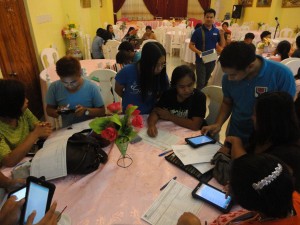
Cordillera Administrative Region – The Listahanan, or the National Household Targeting System for Poverty Reduction (NHTS-PR), of the Department of Social Welfare and Development (DSWD) will now use tablet computers for faster family assessment specially in urban barangays.
A total of 116 tablet computers will be distributed to all provinces in the region which will be used by trained enumerators.
“The use of tablet computers will facilitate our efforts in ensuring efficiency of the assessment since the data gathered by the enumerators will automatically be entered into the system. This is seen to lessen human errors that may occur during manual encoding of family assessment forms in the system,” DSWD Cordillera Administrative Region OIC Regional Director Janet P. Armas said.
Prior to tablet enumeration, the Listahanan used paper-and-pen enumeration by filling out family assessment forms (FAFs) based on the data gathered from the households. After review of the area supervisors and area coordinators, the assessment forms will be submitted in the DSWD Field Office for encoding in the Listahanan system. The tablet enumeration will cut down the process since the data entered in the tablet computers will immediately go to the system.
“There are still area supervisors to conduct spot check and re-interview to ensure correctness of data gathered through the tablets and verifiers to check completeness of the data entered in the system,” Armas said.
Using the tablet enumeration, the Listahanan will use pockets-of-poverty approach in urban barangays. Pockets-of-poverty refer to areas/sitios in the barangays where poor families reside. These areas will be identified in coordination with the local government units.
There are 77 urban barangays in the Cordilleras to employ full table enumeration and pockets-of-poverty approach: 25 barangays in Abra, six (6) in Apayao, 22 in Benguet, nine (9) in Ifugao, 10 in Kalinga, and five (5) in Mt. Province. # DSWD-CAR, Social Marketing Unit, Kaye Ann O. Mapalo




